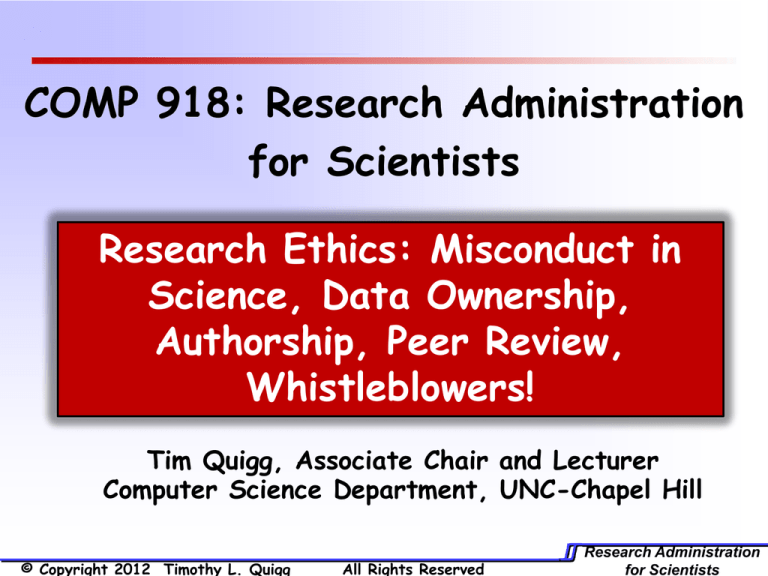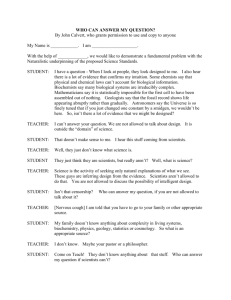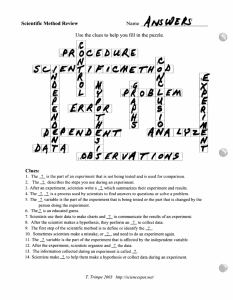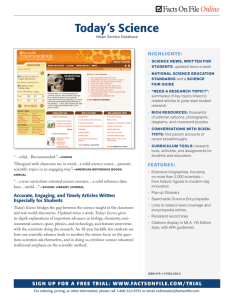
COMP 918: Research Administration
for Scientists
Research Ethics: Misconduct in
Science, Data Ownership,
Authorship, Peer Review,
Whistleblowers!
Tim Quigg, Associate Chair and Lecturer
Computer Science Department, UNC-Chapel Hill
© Copyright 2012 Timothy L. Quigg
All Rights Reserved
Research Administration
for Scientists
Science
is a community
based on
Trust!
Research Administration
for Scientists
“Most Americans see strong science as
essential to a successful future. Yet
that generous social support is based
on the premise that science will be
done honestly and that mistakes will
be routinely identified and corrected.”
Bruce Alberts, President,
National Academy of Sciences,
Research Administration
for Scientists
“The right to search for
truth
implies also a duty;
one must not conceal any part
of what one has
recognized to be true.”
- Albert Einstein
Research Administration
for Scientists
“The only ethical principle
which has made science
possible is that the truth
shall be told all the time…”
C.P. Snow “The Search” 1959
Quoted in “Honor in Science”
Research Administration
for Scientists
Three Important Themes
in Science!
Trust
Truth-telling
Ethics
Research Administration
for Scientists
Ethics: What is it?
1. A set of principles for right conduct.
2. The formal rules and standards
governing the conduct of an
individual or the members of a
profession.
3. Expected behavior consistent with
the principles and rules!
Research Administration
for Scientists
Scientific Fraud and Misconduct
Frequency Over the Past 10 Years
Research Administration
for Scientists
Federal Definition
Research Misconduct:
Fabrication, falsification, or plagiarism in
proposing, performing, or reviewing research
or in reporting research results is research
misconduct. It does not include honest
error or differences of opinion.
Research Administration
for Scientists
Federal Definition
Research Misconduct:
Fabrication, falsification, or plagiarism in
proposing, performing, or reviewing research
or in reporting research results is research
misconduct. It does not include honest
error or differences of opinion.
making up data or results and then either
recording or reporting them!
Research Administration
for Scientists
Federal Definition
Research Misconduct:
Fabrication, falsification, or plagiarism in
proposing, performing, or reviewing research
or in reporting research results is research
misconduct. It does not include honest
error or differences of opinion.
manipulating research materials, equipment,
or processes, or changing or omitting data or
results such that the research is not
accurately represented in the research
record.
Research Administration
for Scientists
Federal Definition
Research Misconduct:
Fabrication, falsification, or plagiarism in
proposing, performing, or reviewing research
or in reporting research results is research
misconduct. It does not include honest
error or differences of opinion.
the appropriation of another person’s ideas,
processes, results, or words without giving
appropriate credit.
Research Administration
for Scientists
Federal Definition
Research Misconduct:
Fabrication, falsification, or plagiarism in
proposing, performing, or reviewing research
or in reporting research results is research
misconduct. It does not include honest
error or differences of opinion.
Universities have primary responsibility
for the prevention and detection of
research misconduct
and for the inquiry and investigation of
alleged research misconduct!
Institutional Compliance
Universities have developed
systems to monitor and manage
compliance at both the individual
and the institutional levels!
Compliance Officers reporting
directly to the Chancellor have
become widespread!
Research Administration
for Scientists
Institutional Compliance Systems
involve training, monitoring and
evaluation of all aspects of
research compliance
Proper fiscal management of public
funds
Protection of human and animal research
subjects
Proper use and disposal of hazardous
materials
Strict adherence to the scientific
method (and telling all the truth) to
produce valid knowledge
Importance of the Laboratory
Notebook!
The laboratory notebook (real or virtual) is still the
“gold standard” and final authority on data collection,
manipulation, and presentation and must contain:
All the information on an experiment’s design
and execution
The original data (preferably as the raw data
output)
Calculations and data reductions
Conclusions and interpretations
A bias toward paper over electronic remains
Should be signed, dated (and witnessed)!
Research Administration
for Scientists
Who Owns Data?
PI, Institution or Funding
Agency?
It Depends!
If created under a sponsored research
agreement, check the data rights clause – data
may be owned by sponsor.
Remember, Agreements are between the
university and the funding agency in the name of
a PI - the university may have obligations to
deliver data, thus the university may own data.
Always check the university’s data rights policy.
Case Study: Data Ownership
A graduate student has just defended
her dissertation and is leaving for a
post doctoral position.
While packing up her office she is
informed by her mentor that she may
not remove the laboratory notebooks
which contain the research data.
Research Administration
for Scientists
Who do you think owns the research
data?
Should the student have been
allowed to take the results of her
labors? How about a copy?
Would your view be different if the
student was going to a competitor’s
laboratory?
Research Administration
for Scientists
Case Study: Fabrication
You believe the work of a fellow student
is forged. The data are too clean, the
student isn’t in the lab enough to support
the amount of data generated, and
insufficient reagents are being consumed
to justify the amount of data.
Research Administration
for Scientists
Is there enough “evidence” to allege
data fabrication?
Let’s say you report your suspicions to
the PI and are simply told to “mind
your own business”, what would you
do?
When have you adequately fulfilled
your ethical responsibilities?
Research Administration
for Scientists
Case Study: Falsification-1
You are a junior member of a research
team using an autoanalyzer to test the
effects of radioprotective agents on
prostaglandin production. Only six of
the ten assays demonstrate protection.
The senior researcher (not PI) suggests
the lack of observed response was due
to “equipment failure.”
Research Administration
for Scientists
Is this assessment valid? Should it be
accepted, rejected or questioned?
How might this assessment be tested?
If the ambiguity persists, how should
you proceed?
Is leaving full responsibility with the
senior person enough?
Research Administration
for Scientists
Case Study: Falsification-2
You prepare a “scatter-graph” that
demonstrates a time-dependent effect.
Unfortunately, several points do not
closely follow the relationship.
Your advisor suggests dropping the
lowest points because “the cells were
obviously dead” and the highest point
because “it is an obvious outlier.”
Research Administration
for Scientists
Is the suggested method for
determining which points to exclude
acceptable?
How would you approach your advisor
when facing an issue pertaining to
proper ethical behavior?
What other course(s) of action are
open to you in this situation?
Research Administration
for Scientists
Case Study: Plagiarism
You are reviewing a paper for a journal and
recognize a significant portion of the text.
After checking, you confirm that the
paper indeed incorporates entire passages
from other works (without attribution).
Research Administration
for Scientists
What Action Would You
Take?
Would you consider dropping the issue
if the author apologized and explained
it was an unintended oversight?
How about if the author was a “first
year” graduate student with little
experience?
How about if the author was from a
country with different standards
about citations?
Authorship
Authorship of a scientific paper should
be limited to those individuals who have
contributed directly to the design and
execution of the experiments and/or
who have participated in the preparation
of the manuscript.
Note: While some variation exists among
disciplines, these rules still generally apply!
Case Study: Authorship
A paper is being prepared concerning the
metabolism of sulfites. Which of the
following should be included as authors?
– Toxicologist who provided previously
published information on animal models.
– Wildlife specialist who provided information
on breeding mice.
– Technician who helped develop assay and
wrote the methods section.
– Another scientist who helped design
experiments and edited the final draft.
Research Administration
for Scientists
Peer review is the process
whereby scientists
evaluate their colleagues’
grant applicants for
funding and scientific
papers for publication.
The two standards that
must always be observed:
Fairness and Confidentiality!
Research Administration
for Scientists
Case Study: Peer Review
An investigator (who is both a faculty
member and a consultant to a biotech
company) serves on an NIH study section.
He reviews a grant which contains
information demonstrating that his
current work (both academic and
corporate) is headed down a blind alley.
Research Administration
for Scientists
How should the investigator
proceed?
What issues of confidentiality
and conflict of interest are
involved?
How might this situation have
been avoided?
Research Administration
for Scientists
False Claims Act:
Whistleblowers
A good faith allegation is made with
the honest belief that research
misconduct may have occurred. An
allegation is not in good faith if it is
made with reckless disregard for or
willful ignorance of facts that would
disprove the allegation.
Research Administration
for Scientists
Qui Tam provisions of the
False Claims Act
“Who sues on behalf of the King as well as
for himself”
Allows private parties to sue entities and
individuals that have submitted false claims
to the federal government
Can receive a portion of the settlement if
the government receives a monetary
agreement with the defendant
Research Administration
for Scientists
Qui Tam provisions of the
False Claims Act
■
■
■
Allows any person with actual knowledge of
allegedly false claims to the government to
file a lawsuit on behalf of the U.S.
government.
Such persons are referred to as “relators.”
Individuals seeking whistleblower status
must meet several criteria to prevail.
Research Administration
for Scientists
False Claims Act Recovery
In 2008, federal government recovered
approximately $1.3 billion;
90% of recovery came from health care
industry, including pharmaceutical
companies;
For 2009, Congress allocated an additional
$25 million to combat fraud and abuse in
Medicaid Program alone.
Research Administration
for Scientists
University of Georgia
FCA Case
The 2006 suit charged researchers and
faculty at the University of Georgia with
violations of the False Claims Act for
receiving more than $1 million in federal
grants from the EPA based on published
research using allegedly manipulated data
that discounted the toxicity of sewage
sludge;
Research Administration
for Scientists
University of Georgia
FCA Case
The suit was filed by the U.S. government
on behalf of qui tam (whistle-blower)
plaintiffs David L. Lewis, an adjunct senior
research scientist at UGA and a former
microbiologist at the Environmental
Protection Agency, and two farming
families that contend the sludge killed
their cattle and contained harmful
chemicals;
Research Administration
for Scientists
University of Georgia
FCA Case
The suit alleged that sludge samples were not
included from farms that reported animal
deaths and were taken only during drought
periods when toxin levels would be lowest. It
also charged that the researchers
"knowingly used false statements and
fabricated scientific data to obtain federal
funds in violation of the False Claims Act."
Case still in litigation!
Research Administration
for Scientists
St. Louis University
FCA Case
The suit was brought by whistleblower and
former Dean, Andrew Balas who alleged the
SLU School of Public Health overstated time
spent by faculty members on CDC grants,
resulting in overpayment of supplemental
income.
The Investigation indicated that other NIH and HUD
grants were also charged for these “phantom faculty
work” hours resulting in similar overpayments.
Research Administration
for Scientists
St. Louis University
FCA Case
SLU’s defense: They had made a good faith
effort to comply with “highly complicated
cost accounting principles governed by
regulations that are hundreds of pages long.
Any mistakes made were simply unintentional
mistakes!”
SLU settled this False Claims Act suit
for $1 million. Whistleblower
received share ($190,000) of
recovery !
Research Administration
for Scientists
Weill Medical College Cornell
FCA Case
(Whistleblower was a senior administrative
assistant to PI; worked at Cornell for 11 years,
resigned in ’02; filed suit in April 2004)
Lawsuit alleged that PI misrepresented which
researchers were working on particular
grants; misapplied and fraudulently accounted
for grant funds; falsified data from
research; and submitted same projects
multiple times even if funded by other grants
Research Administration
for Scientists
Weill Medical College Cornell
FCA Case
(Whistleblower was a senior administrative
assistant to PI; worked at Cornell for 11 years,
resigned in ’02; filed suit in April 2004)
Lawsuit alleged that PI misrepresented which
researchers were working on particular
grants; misapplied and fraudulently accounted
for grant funds; falsified data from
research; and submitted same projects
multiple times even if funded by other grants
Research Administration
for Scientists
Weill Medical College Cornell
FCA Case
(Whistleblower was a senior administrative
assistant to PI; worked at Cornell for 11 years,
resigned in ’02; filed suit in April 2004)
Lawsuit alleged that PI misrepresented which
researchers were working on particular
grants; misapplied and fraudulently accounted
for grant funds; falsified data from
research; and submitted same projects
multiple times even if funded by other grants
Research Administration
for Scientists
Weill Medical College Cornell
FCA Case
(Whistleblower was a senior administrative
$2.6
million
assistant to PI; worked at Cornell for 11 years,
resigned in Settlement!
’02; filed suit in April 2004)
Lawsuit alleged that PI misrepresented which
researchers were working on particular
grants; misapplied and fraudulently accounted
for grant funds; falsified data from
research; and submitted same projects
multiple times even if funded by other grants
Research Administration
for Scientists
Yale University FCA Case
Yale researchers allegedly spent down
remaining grant funds near the expiration
dates via cost transfers that were deemed
not “allocable” (costs that relate to the
specific objectives of the specific project).
Federal regulations require that unspent
grant funds be returned to the government.
Research Administration
for Scientists
Yale University FCA Case
■
■
■
$7.6 million final settlement ($3.8 million
actual damages plus $3.8 million punitive
damages).
No criminal charges, no admission of
liability, government acknowledged Yale’s
cooperation and ongoing reform efforts.
Cost of consulting and legal fees likely
exceeded cost of settlement!
Research Administration
for Scientists
Selected University Settlements
Revealed via Qui Tam (Whistleblower):
■ Northwestern- $5.5 M (Feb, 2003)
■ Johns Hopkins - $2.6 M (Feb, 2004)
■ Univ. Alabama-Birm- $3.4 M (Apr, 2005)
■ Cornell- $4.4 M (Jun, 2005)
■ Univ. Connecticut- $2.5M (Jan, 2006)
Revealed via voluntary disclosure:
■ Harvard- $2.4 M (June 2004)
All involved overstatement of effort on
NIH grants!
Research Administration
for Scientists
Case Study: Effort
Reporting
Physician Scientist Dr. E. Coli
2 NIH grants (@ 25% effort)
3 days/week in clinic
Directs Infectious Diseases medical
curriculum
Lectures to medical students three
times per week, and
Serves on the institutional promotion
and tenure committee.
Research Administration
for Scientists
■
■
Is there a potential problem
with this investigator’s time
commitment?
How might he manage this?
Research Administration
for Scientists
Federal Investigative Offices:
■
■
Office of Research Integrity in the DHHS,
promotes integrity in biomedical and
behavioral research supported by PHS. ORI
monitors institutional investigations of
research misconduct (www.ori.hhs.gov)
Office of the Inspector General in the NSF
is responsible for preventing, detecting, and
handling cases involving research misconduct
(www.nsf.gov/oig)
Research Administration
for Scientists
Reports to the Office of Research
Integrity (ORI) or OIG of NSF
■
■
Inquiry: information gathering and
initial fact-finding to determine
whether an allegation warrants an
investigation (usually up to 60 days)
Investigation: the formal examination
and evaluation of all relevant facts to
determine if misconduct has occurred
(usually up to 120 days)
Research Administration
for Scientists







